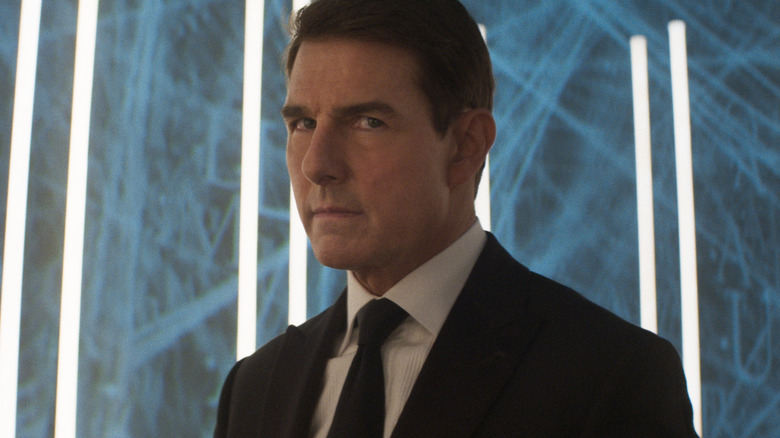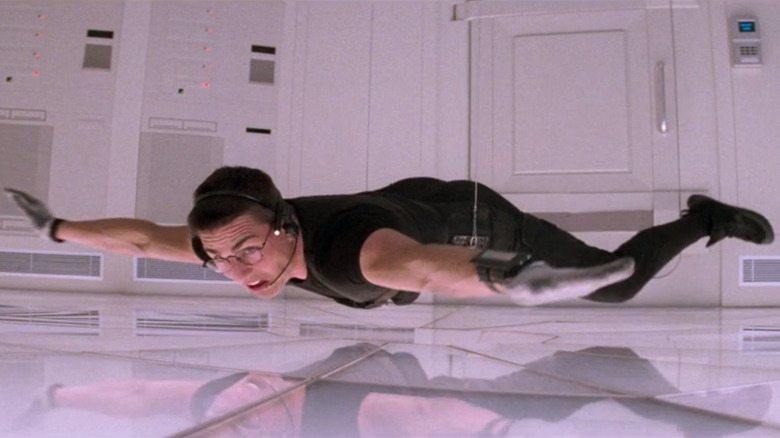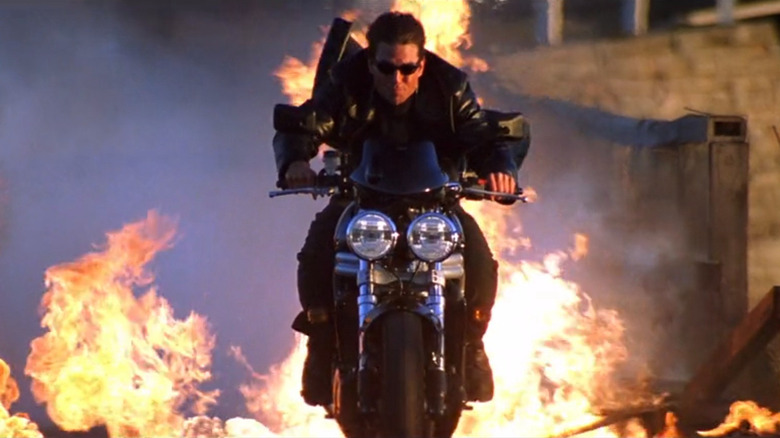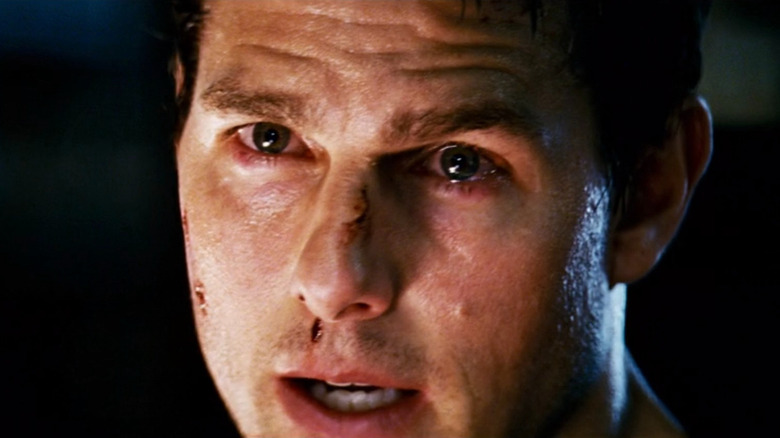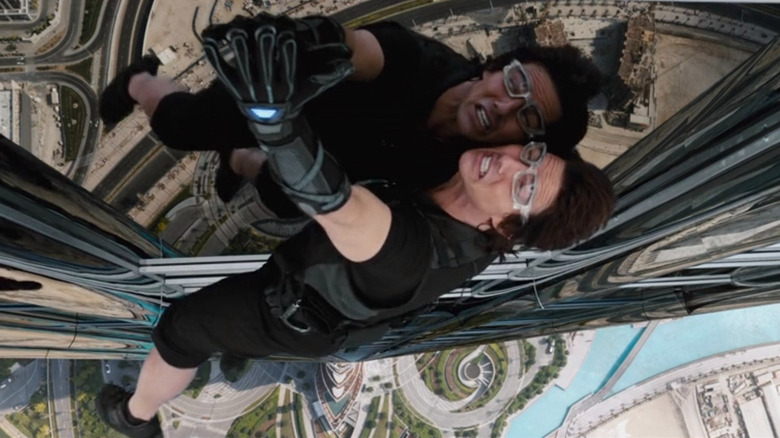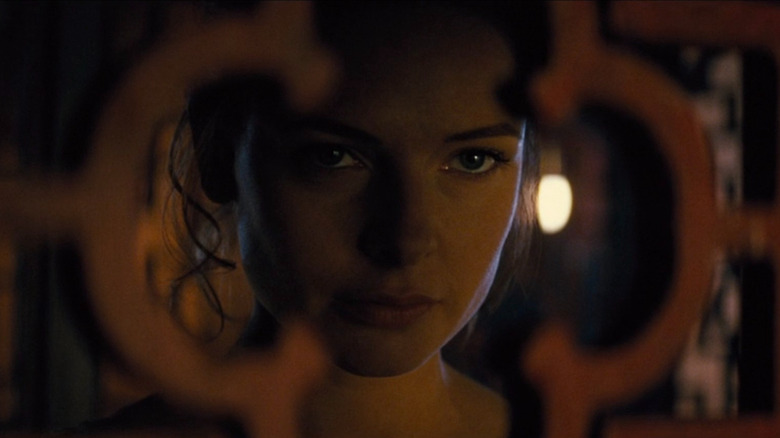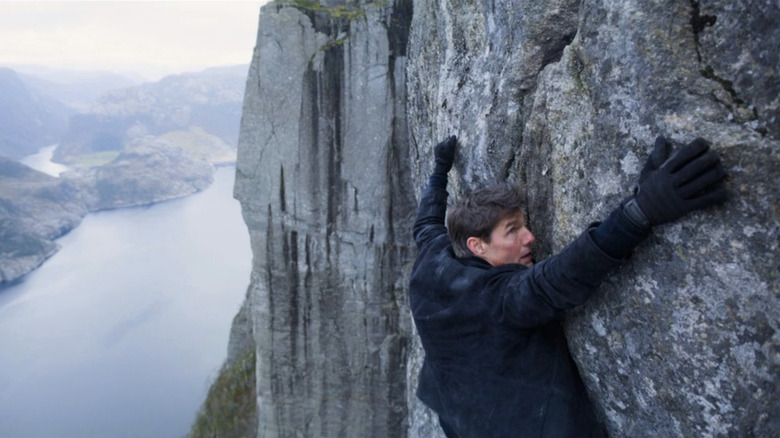Everything You Need To Remember About Mission: Impossible For Dead Reckoning Part One
Nothing in the Hollywood franchise ecosystem revs my engines like the "Mission: Impossible" film series. We live in a world filled with sequels of diminishing returns that feel as though they were grabbed off an assembly line and pushed onto 4,000 screens to bore me for 150 minutes before I go home. I want to love the mega-budget blockbusters that get released. I want to be hooting and, indeed, hollering when something awe-inspiring occurs, causing me to pump my fist in the air. The only series right now that gets me to that level is "Mission: Impossible," and what makes the series all the more extraordinary is that they keep getting better.
So, to say that I am excited for the series' seventh installment "Mission: Impossible - Dead Reckoning Part One," which hits theaters on July 12, 2023, would be a massive understatement. Tom Cruise and writer/director Christopher McQuarrie, who came on board as a writer for "Ghost Protocol" and has directed every entry since "Rogue Nation," have figured out the perfect balance of classical Hollywood adventure storytelling, character relationship drama, and out-of-this-world action set pieces that, frankly, put every other competitor to shame. There is a reason I already have tickets to multiple different showtimes over the film's first week of release.
As we head into the first of the two-part "Dead Reckoning" epic, let's look back at the previous six films in the franchise and give ourselves a bit of a refresher course on what Ethan Hunt and the Impossible Missions Force have been up to since the first film's release 27 years ago.
Mission: Impossible
The film that started it all. Brian De Palma's "Mission: Impossible" may not stylistically resemble the films we've seen recently, but much of the DNA of the series is still at the heart of this film. Most notably, we have Tom Cruise's Ethan Hunt and his relationship to his team. The television series, which the films are adapted from, was an ensemble show about a team of spies who all have their own specialties and would work together for the mission of the week, led (mostly) by Peter Graves' Jim Phelps. "Mission: Impossible" sets up a team featuring the likes of Kristin Scott Thomas and Emilio Estevez, and it's led by Jim Phelps, with Jon Voight taking on the role. However, the team is killed, with the exception of Phelps and his wife (Emmanuelle Béart) who are the betrayers.
Although this sets up Hunt to be the lone wolf who can't trust anyone, including the IMF itself in the form of director Eugene Kittridge (Henry Czerny), he does find an ally in tech wizard Luther Stickell (Ving Rhames), the only other cast member to appear in every single film along with Cruise. Their partnership and evolving friendship over the series rarely takes a total front seat in the drama, but it remains vital in Ethan being able to open himself up to other people after what happens in this film.
Director Kittridge has not been seen since "Mission: Impossible." However, he is making a grand return in "Dead Reckoning Part One." In what capacity? That I don't know. He may still be director. He may have defected. Also out in the ether is arms dealer Max (Vanessa Redgrave). We may never see her again, but we will see her daughter. More on that later.
Mission: Impossible 2
"Mission: Impossible 2" is easily the most disconnected from the rest of the series, which is a good thing because it is the series low point. This film is a culmination of all the excesses of the 1990s and directed by one of the most excessive filmmakers of the time, John Woo. While there is some fun to be had and the film does feature a couple of memorable sequences, almost nothing about gets carried over into the subsequent films.
The big backbone of this concerns a love story with Thandiwe Newton as a thief who partners up with Ethan to recover a virus stolen by a former IMF agent (Dougray Scott). The film even ends with the two of them going on holiday together, presumably to start a life of love and happiness, and yet when Luther recalls the loves of Ethan's lives in "Fallout," there isn't even a passing mention of her.
Although the film was a big hit, making over half a billion worldwide back in 2000, everyone recognizes this to be the black sheep of the series, and wisely, everyone involved has done a fantastic job conveniently forgetting about it. Unlike being excited to see Henry Czerny return from the first film, it would be odd to see Thandiwe Newton or Anthony Hopkins, who has an uncredited cameo as a different IMF director, in a new film. "Mission: Impossible 2" will remain the series' odd curio, and that's fine.
Mission: Impossible III
This may be the third film in the series, but in a way, this is really the start of "Mission: Impossible" as we know it today, even if I think it to be inferior work to the original film. We pick up with Ethan dating and then eventually getting married to nurse Julia Meade (Michelle Monaghan) in the suburbs, freshly resetting our status quo of the character. Naturally, she does not know that her husband is an international super spy. Having this relationship clearly shows there is some desire inside Ethan to live a normal life, but over the course of the film, which involves Julia being abducted by the film's villain (brilliantly played by the late, great Philip Seymour Hoffman), he comes to realize that saving the ones he loves is just as important as saving the entire world. This will become the central thesis of Ethan Hunt for the remainder of the series.
"Mission: Impossible III" also introduces us to the second member of Ethan's core team: Benji Dunn (Simon Pegg). He only appears in two scenes, working as a tech guy in the IMF offices, but he and Ethan immediately have a rapport with one another that the idea of not bringing him back would be silly. It shows how a character originally designed to be a comedic relief functionary (who was supposed to be a cameo from Ricky Gervais) can eventually turn into someone you can't see these movies existing without. "Mission" wouldn't be "Mission" without Benji and Julia, and we have "Mission: Impossible III" to thank for that.
Ghost Protocol
"Mission: Impossible III" may start to crystallize things on a character level for the series, but "Mission: Impossible – Ghost Protocol" does that for the action set pieces. These movies have always had high-octane thrills, but this is the one where the set pieces are built around Tom Cruise deciding to do something truly crazy as a centerpiece. Nowhere is that more apparent than when Ethan finds himself having to climb up and then run down the Burj Khalifa in Dubai, the tallest building in the world. Most productions would have the actor do this on a green screen in a studio or have a stunt double perform it. Not "Mission: Impossible." Cruise is really going to hang off the side of that building. Also key is that Brad Bird ditches much of the frenetic style of the previous two installments into something much more classical to fully showcase just how incredible what Cruise is doing truly is.
"Ghost Protocol" sees two major introductions. We have Jeremy Renner entering the fold as an IMF agent Brandt who believes he is responsible for the death of Julia in between movies (thankfully, Julia isn't dead), making for a fun addition to the team. More importantly, though, this is where Christopher McQuarrie joins the fray, and though he is uncredited, just about everyone involved in the movie credits him for taking a film that was in pieces story-wise and giving shape and purpose to it all. The film also starts transitioning Ethan into the reluctant hero, having to perform these death-defying feats purely out of begrudging necessity rather than just aesthetic reasons, which is so key in making him a relatable character. "Ghost Protocol" takes what was a good series and makes it a great one.
Rogue Nation
The "Mission: Impossible" movies, until this point, have all been pretty discreet entities. Notably, the previous four films were all directed by extremely individualistic filmmakers, and you could basically watch, understand, and enjoy any of the previous films without having seen any of the others. "Rogue Nation" is where serialization really starts coming into the picture as Christopher McQuarrie steps up from writer to writer/director on this project. Ethan, Benji, Luther, and Brandt aren't just "a" team. They are "the" team with history, respect, and love between them. This film also picks up a thread dangling at the end of "Ghost Protocol:" the Syndicate, which is essentially the anti-IMF led by Solomon Lane (Sean Harris), giving Ethan a Blofeld and SPECTRE that he hadn't had before.
More than anything, "Rogue Nation" gives us Ilsa Faust, played by the great Rebecca Ferguson. Disavowed by MI6, Ilsa has been tasked to go undercover in the Syndicate as a way to prove her loyalty, not knowing that her superiors in fact created the Syndicate in the first place. You never can fully know what side she's on, and through her charisma and skills, she makes for the perfect match and foil for Ethan Hunt. When Cruise and Ferguson are on screen together, it's when the series is at its best, as the two have a crackling chemistry that is truly romantic without ever being explicit in that romanticism in the slightest. She was the missing piece that "Mission: Impossible" needed.
"Rogue Nation" also takes the set pieces to a new level. You have the underwater heist sequence requiring Cruise to hold his breath for minutes on end, the backstage opera fight scene, and Cruise hanging off the side of an A400 plane in the opening scene. Spellbinding Hollywood entertainment.
Fallout
"Mission: Impossible – Fallout" is the series' magnum opus thus far. A breathlessly exciting, surprisingly emotional action epic that is one of the best films of the 2010s. Christopher McQuarrie amps up the serialization even more. He doesn't just bring back Ilsa, Benji, Luther, and new IMF secretary Alec Baldwin, but he even brings back the villain of the previous film in Sean Harris' Solomon Lane, giving us the first true-blue direct sequel of the franchise. "Mission: Impossible" is no longer an episodic mission series starring Tom Cruise. This is a fully-realized world with mythology and history now.
Also crucial: he brings back Michelle Monaghan's Julia. The end of "Mission: Impossible III" promised there was more to that story, but "Ghost Protocol" kind of dodges that. Ethan needed closure with his ex-wife, and "Fallout" delivers it in an unexpected and completely earned way. The connections don't stop there, though, as we are also introduced to Alanna "White Widow" Mitsopolis (Vanessa Kirby), an arms dealer who is the daughter of Vanessa Redgrave's Max from the first film, and the White Widow will be back in "Dead Reckoning Part One."
Someone who won't be back is Henry Cavill's CIA assassin/international terrorist John Lark (or his mustache), considering he meets his untimely end in "Fallout." What I enjoy so much about that character is that Ethan hasn't had a physically imposing adversary for almost the entire series, often finding himself against middle-aged crazed eggheads.
"Fallout" leaves us with Ilsa ostensibly joining the official team with Benji and Luther. Ethan is able to close the book on Julia and possibly is able to open one with Ilsa. Only one way to find out where we go from here: see "Mission: Impossible – Dead Reckoning Part One" in theaters on July 12, 2023.
